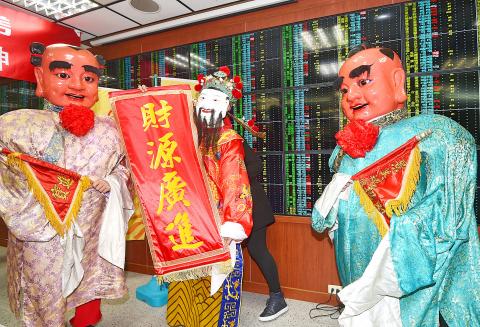The TAIEX yesterday rallied 2.81 percent, or 293.35 points, to close at 10,714.44, as investors rebuilt their positions to catch up with gains on Wall Street over the Lunar New Year holiday, traders said.
The Dow Jones industrial average picked up more than 700 points during the Lunar New Year break in Taiwan, despite a 254-point drop on Tuesday after disappointing earnings results from major US corporations, while pressure over interest rate hikes escalated.
“The rebound in the TAIEX might be sustainable as the global economy improves, although uncertainty over capital movements and a potential market correction remains,” Yuanta Securities Investment Consulting Co (元大投顧) senior manager Lee Cheng-yen (李政諺) said.

Photo: Fang Pin-chao, Taipei Times
Yields on US 10-year bonds rose to 2.87 percent last week, driving fund managers to slash investment-grade corporate debts by US$2 billion and emerging market debts by US$2.9 billion, the worst capital flight in 60 and 64 weeks respectively, JPMorgan Asset Management Taiwan said.
Unease is gathering strength amid worries that the US Federal Reserve might raise borrowing costs more quickly this year after US consumer prices climbed more than expected last month, which could be read as signs the US economy is overheating, the US fund house said.
Monetary tightening moves would suggest less funds available for equity markets across the world.
However, foreign institutional players increased holdings in local shares by a net NT$9.21 billion (US$314.9 million) yesterday, while mutual funds and proprietary traders recorded net purchases of NT$473.47 million and NT$82.98 billion, Taiwan Stock Exchange data showed.
Turnover rose to NT$145.13 billion, a 36 percent increase from NT$106.59 billion on Monday last week, the last trading day before the holiday break, according to the Taiwan Stock Exchange (TWSE).
The TAIEX is likely to consolidate between 10,500 and 10,800 points, with a positive bias in the short term, Yuanta Securities said.
Technology shares led yesterday’s rebound, with optical plays seeing the biggest advance of 5.26 percent.
Shares of Largan Precision Co (大立光), which supplies camera lenses for international smartphone brands, ended up 7.34 percent at NT$3,950, while Taiwan Semiconductor Manufacturing Co (台積電), the world’s largest contract chipmaker, gained 2.54 percent to NT$242.50, TWSE data showed.
The food sector picked up 3.89 percent, with shares of food and retail conglomerate Uni-President Enterprises Corp (統一企業) rising 5.65 percent to NT$69.20 and shares of Wei Chuan Foods Corp (味全食品) advancing 3.02 percent to NT$22.20, data showed.
Food makers usually benefit from a surge in business over the holiday.

With an approval rating of just two percent, Peruvian President Dina Boluarte might be the world’s most unpopular leader, according to pollsters. Protests greeted her rise to power 29 months ago, and have marked her entire term — joined by assorted scandals, investigations, controversies and a surge in gang violence. The 63-year-old is the target of a dozen probes, including for her alleged failure to declare gifts of luxury jewels and watches, a scandal inevitably dubbed “Rolexgate.” She is also under the microscope for a two-week undeclared absence for nose surgery — which she insists was medical, not cosmetic — and is

CAUTIOUS RECOVERY: While the manufacturing sector returned to growth amid the US-China trade truce, firms remain wary as uncertainty clouds the outlook, the CIER said The local manufacturing sector returned to expansion last month, as the official purchasing managers’ index (PMI) rose 2.1 points to 51.0, driven by a temporary easing in US-China trade tensions, the Chung-Hua Institution for Economic Research (CIER, 中華經濟研究院) said yesterday. The PMI gauges the health of the manufacturing industry, with readings above 50 indicating expansion and those below 50 signaling contraction. “Firms are not as pessimistic as they were in April, but they remain far from optimistic,” CIER president Lien Hsien-ming (連賢明) said at a news conference. The full impact of US tariff decisions is unlikely to become clear until later this month

GROWING CONCERN: Some senior Trump administration officials opposed the UAE expansion over fears that another TSMC project could jeopardize its US investment Taiwan Semiconductor Manufacturing Co (TSMC, 台積電) is evaluating building an advanced production facility in the United Arab Emirates (UAE) and has discussed the possibility with officials in US President Donald Trump’s administration, people familiar with the matter said, in a potentially major bet on the Middle East that would only come to fruition with Washington’s approval. The company has had multiple meetings in the past few months with US Special Envoy to the Middle East Steve Witkoff and officials from MGX, an influential investment vehicle overseen by the UAE president’s brother, the people said. The conversations are a continuation of talks that

CHIP DUTIES: TSMC said it voiced its concerns to Washington about tariffs, telling the US commerce department that it wants ‘fair treatment’ to protect its competitiveness Taiwan Semiconductor Manufacturing Co (TSMC, 台積電) yesterday reiterated robust business prospects for this year as strong artificial intelligence (AI) chip demand from Nvidia Corp and other customers would absorb the impacts of US tariffs. “The impact of tariffs would be indirect, as the custom tax is the importers’ responsibility, not the exporters,” TSMC chairman and chief executive officer C.C. Wei (魏哲家) said at the chipmaker’s annual shareholders’ meeting in Hsinchu City. TSMC’s business could be affected if people become reluctant to buy electronics due to inflated prices, Wei said. In addition, the chipmaker has voiced its concern to the US Department of Commerce